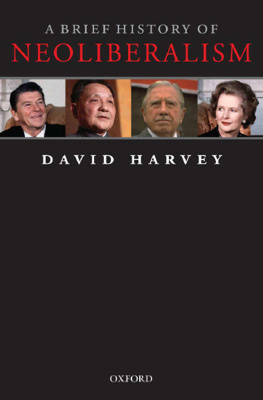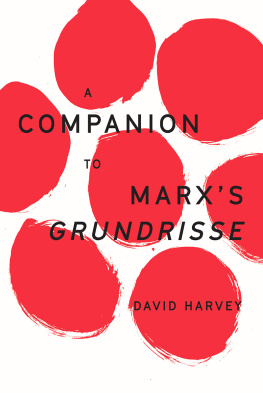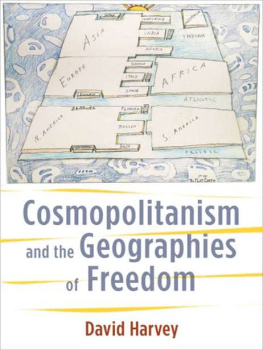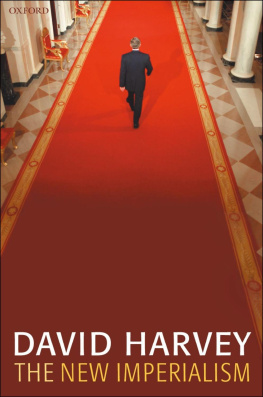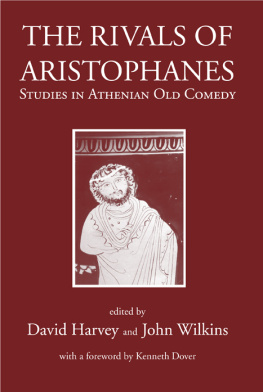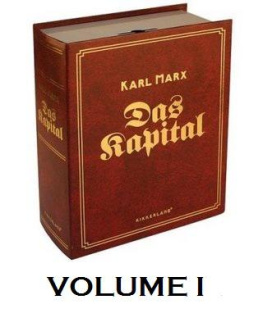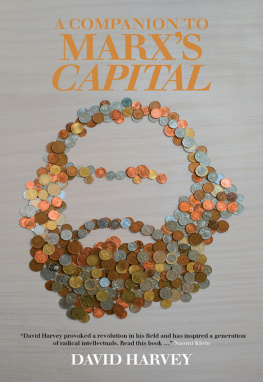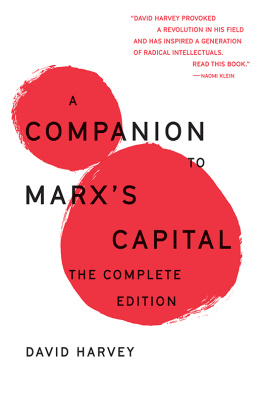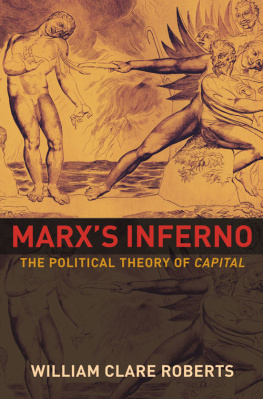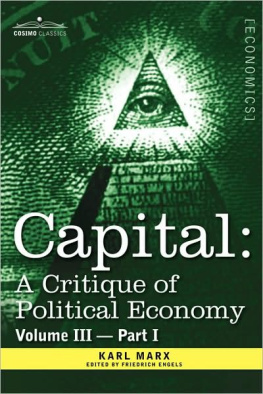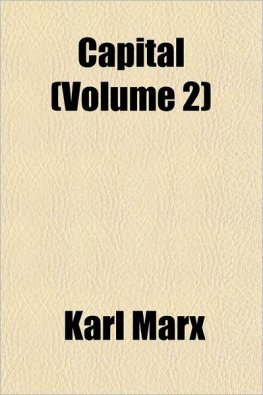Marx, Capital and the Madness of Economic Reason
David Harvey is Distinguished Professor of Anthropology at the City University of New York Graduate School where he has taught since 2001. His books The Enigma of Capital, Seventeen Contradictions and the End of Capitalism and The Ways of the World were published by Profile in 2010, 2014 and 2016 to international acclaim.
ALSO BY DAVID HARVEY
Explanation in Geography
Social Justice and the City
The Limits to Capital
The Urbanisation of Capital
Consciousness and the Urban Experience
The Urban Experience
The Condition of Postmodernity
Justice, Nature and the Geography of Difference
Spaces of Hope
Spaces of Capital
The New Imperialism
Paris, Capital of Modernity
A Brief History of Neoliberalism
Spaces of Global Capital
A Companion to Marxs Capital, Volumes I and II
The Enigma of Capital
Rebel Cities
Seventeen Contradictions and the End of Capitalism
The Ways of the World
Marx, Capital and the Madness of Economic Reason
DAVID HARVEY

First published in Great Britain in 2017 by
PROFILE BOOKS LTD
3 Holford Yard
Bevin Way
London WC1X 9HD
www.profilebooks.com
Copyright David Harvey, 2017
The moral right of the author has been asserted.
All rights reserved. Without limiting the rights under copyright reserved above, no part of this publication may be reproduced, stored or introduced into a retrieval system, or transmitted, in any form or by any means (electronic, mechanical, photocopying, recording or otherwise), without the prior written permission of both the copyright owner and the publisher of this book.
A CIP catalogue record for this book is available from the British Library.
eISBN 978 1 78283 368 0
Contents
List of figures
Mad world! Mad kings! Mad composition!
That smooth-facd gentleman, tickling commodity,
Commodity, the bias of the world;
The world, who of itself is peised well
Made to run even upon even ground.
Till this advantage, this vile-drawing bias,
This sway of motion, this commodity,
Makes it take head from all indifferency,
From all direction, purpose, course, intent.
And this same bias, this commodity,
This bawd, this broker, this all-changing word
And why rail I on this commodity?
But for because he hath not wood me yet.
Not that I have the power to clutch my hand
When his fair angels would salute my palm;
But for my hand, as unattempted yet,
Like a poor beggar, raileth on the rich.
Well, whiles I am a beggar, I will rail
And say here is no sin, but to be rich;
And being rich, my virtue then shall be
To say there is no vice but beggary.
Since kings break faith upon commodity,
Gain, be my lord, for I will worship thee.
William Shakespeare, King John
Prologue
Throughout his life Marx made a prodigious effort to understand how capital worked. He was obsessed with trying to figure out how what he called the laws of motion of capital affected daily life of the common people. He relentlessly exposed the conditions of inequality and exploitation that lay buried in the morass of self-congratulatory theories propounded by the ruling classes. He was particularly interested in why capitalism seemed to be so crisis prone. Were these crises, like those he experienced firsthand in 1848 and 1857, due to external shocks, such as wars, natural scarcities and bad harvests, or was there something about the way capital itself worked that made such destructive crashes inevitable? This question still bedevils economic enquiry. Given the sad state and confusing trajectory of global capitalism since the crash of 20078 and its deleterious impacts on the daily lives of millions of people it seems a good moment to review what Marx managed to figure out. Maybe there are some useful insights here to help clarify the nature of the problems we are now facing.
It is not, alas, easy to summarise Marxs findings, and follow his intricate arguments and his detailed reconstructions. This is partly due to the fact that most of his work was incomplete. Only a small fraction of it ever saw the light of day in a form that Marx thought fit for publication. The rest exists as an intriguing and voluminous mass of notes and drafts, comments of self-clarification, thought experiments of the what if it worked like this variety, and a host of rebuttals of real and imagined objections and criticisms. To the degree that Marx himself relied a great deal on a critical interrogation of how classical political economy answered these kinds of questions (where figures like Adam Smith, David Ricardo, Thomas Malthus, James Steuart, John Stuart Mill, Bentham and a host of other thinkers and researchers held sway), so our reading of his findings often demands a working knowledge of those he is criticising. The same is true with respect to Marxs reliance upon classical German philosophy for his critical method, where the imposing figure of Hegel dominates backed up by Spinoza, Kant and a host of other thinkers stretching way back to the Greeks (Marx did his doctorate on the Greek philosophers Democritus and Epicurus). Add the French socialist thinkers, such as Saint-Simon, Fourier, Proud-hon and Cabet into the mix, and the huge canvas upon which Marx sought to construct his oeuvre becomes intimidatingly apparent.
Marx was, moreover, a restless analyst rather than a static thinker. The more he learned from his voluminous reading (not only of the political economists, anthropologists and philosophers but of the business and financial press, Parliamentary debates and Official Reports), the more he evolved his views (or some would say changed his mind). He was a voracious reader of classical literature Shakespeare, Cervantes, Goethe, Balzac, Dante, Shelley and on and on. He not only spiced up his writing (particularly in the first volume of Capital, which is a literary masterpiece) with lots of references to their thinking but he genuinely valued their insights into how the world worked and drew much inspiration from their method of presentation. And if that did not suffice there was a voluminous correspondence with fellow travellers in multiple languages along with lectures and talks to British trade unionists or communications in and around the International Working Mens Association formed in 1864 with its pan-European working-class aspirations. Marx was an activist and polemicist as well as a theorist, scholar and thinker of the first rank. The closest he ever came to getting a steady income was as a regular correspondent to the New York Tribune, which was one of the largest circulation newspapers in the United States at that time. While his columns asserted his distinctive views, they also entailed up-to-date analysis of current events.
In recent times there has been a flurry of comprehensive studies of Marx in relation to the personal, political, intellectual and can be extremely useful but they do not exhaust the terrain of what needs to be known. They do not help solve problems of alienation or of deteriorating social relations.
Marxs prescient commentaries on capitals laws of motion and their internal contradictions, its fundamental and underlying irrationalities, turn out to be far more incisive and penetrating than the one-dimensional macroeconomic theories of contemporary economics that were found so wanting when confronted with the crash of 20078 and its long-drawn-out aftermath. Marxs analyses along with his distinctive method of enquiry and his mode of theorising are invaluable for our intellectual struggles to understand the capitalism of our times. His insights deserve to be taken up and studied critically with all due seriousness.
Next page

